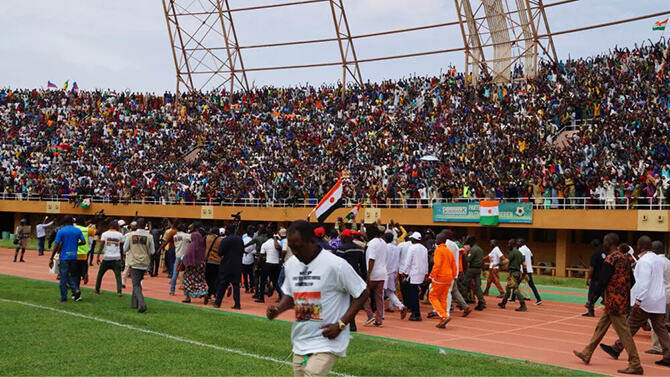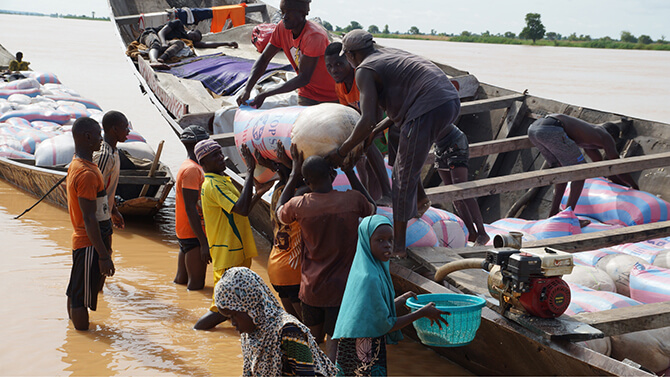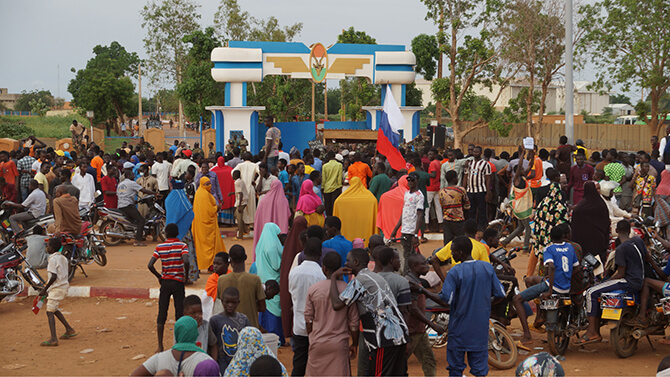Collective punishment’: Sanctions worsen humanitarian conditions in post-coup Niger
‘There are dozens of deaths in our hospitals and health centres.’

A demonstration in support of Niger’s military junta on 6 August 2023 at Kountché stadium in Niamey. Regional countries have threatened a military intervention if the generals don’t stand down and reinstall the president.
The sanctions levied on Niger’s military junta are having a severe impact on the wider population as food prices rise, trade is hampered, and humanitarian organisations struggle to bring relief supplies into the country.
Military leaders seized power on 26 July, ousting the elected president, Mohamed Bazoum, who remains in detention. The putsch followed similar coups in neighbouring Burkina Faso and Mali, which like Niger are fighting destabilising jihadist insurgencies.
The Economic Community of West African states (ECOWAS), a regional bloc, has threatened military action and imposed extensive sanctions, even as the junta wins local support through anti-imperialist rhetoric, and because of discontent with Bazoum.
All commercial trade – including electricity, pharmaceuticals, and food products – have been suspended between Niger and ECOWAS member states, which fear a soft response might send the wrong message to adventurous soldiers in their own countries.
The EU and France – Niger’s former colonial power – have also suspended development aid and budgetary support, which is expected to reduce the government’s ability to run social services and contribute to humanitarian response efforts.
“The current economic and financial sanctions have extremely negative consequences on the lives of the population,” Abdallah Togola, who works for the International Committee of the Red Cross (ICRC) in Niger, told The New Humanitarian.
Niger has seen rising levels of humanitarian need due to jihadist campaigns in western and southeastern parts of the country, and also because of droughts and floods. It is a major supplier of uranium, but France has long exploited the resource on unfair terms.

@Boureima Balima/TNH
Canoes transport goods on the Niger River, which flows through Niamey. Sanctions have badly impacted the local economy and worsened humanitarian conditions.
The World Food Programme (WFP) has estimated that 7.3 million people may be driven from moderate to severe food insecurity as a result of the latest post-coup restrictions, which hit as the country was in its traditional “lean season” between harvests.
The blockade measures were also introduced with no humanitarian exemptions, which means aid agencies have been struggling to bring in supplies for their programmes, some of which may be suspended in the coming weeks.
Aid groups are advocating governments to release blocked supplies, but the junta is wary of importing goods from neighbouring states that they accuse of amassing troops ahead of the mooted military intervention, aid officials told The New Humanitarian.
Price rises and power cuts
Even before the current crisis, around 3.3 million Nigeriens were experiencing severe food insecurity. Market prices had been rising since neighbouring Nigeria lifted fuel subsidies, and because of the lingering impact of the pandemic and the Ukraine conflict.
Nigerien authorities have distributed food to some communities in recent weeks, and have received hundreds of trucks of food from junta-led Burkina Faso, which, like Mali, has kept its borders open to Niger.
Issa Hassane, a local journalist, said people are coping with the situation by supporting each other. “ECOWAS sanctions have strengthened the resilience of the population, developed social cohesion, and steered Nigeriens towards self-sufficiency,” he said.
“ECOWAS sanctions have strengthened the resilience of the population, developed social cohesion, and steered Nigeriens towards self-sufficiency.”
Still, the price of cereals and imported products, including sugar, powdered milk, and vegetable oil, have all increased sharply on markets since the announcement of the sanctions, which Médecins Sans Frontières said amounted to “collective punishment”.
Nigeriens have also been affected by losing 70% of the country’s electricity supply, which came from Nigeria. Businesses are turning to gas-guzzling generators, but merchants say they are expensive to run and fuel is in short supply.
Omar Hamidou, the manager of a convenience store in the capital, Niamey, said he is no longer selling fresh products that need to be kept cool. “Storing milk requires electricity,” he said. “If I take too much quantity and then can’t sell it, I make a loss.”
“ECOWAS has pushed the envelope too far by imposing a blockade,” added Bounty Diallo, a retired teacher and researcher based in Niamey. “Currently, there are dozens of deaths in our hospitals and health centres.”
Diallo said the sanctions are supposed to pressure junta leader Abdourahmane Tiani into reinstating Bazoum but have instead “radicalised” people and fuelled support for the military.
“[The authorities] noted that the sanctions have no effect,” Diallo said. “On the contrary, the more ECOWAS toughens its tone, the more the population regroups around Tiani, giving him their unwavering support.”
Humanitarian operations disrupted
Humanitarian agencies have also been impacted by the sanctions and broader coup fallout. In its latest update, WFP said stocks of certain commodities are running low, creating the risk that assistance will be suspended in the coming weeks and months.
Hundreds of tonnes of food supplies, and containers of cholera and malaria medication, are currently stuck in Benin and Togo, threatening humanitarian response efforts at a time when heavy rains are causing an increase in disease outbreaks.
Restrictions on withdrawing cash from banks have led to issues for aid agencies running cash transfer programmes, and relief groups say there aren’t sufficient in-country school material stocks for the new year starting in October.
ECOWAS Commission President Omar Touray did write to regional governments last month to “suggest” they consider helping humanitarian agencies that need to bring in supplies from neighbouring states.
Benin, the main country that aid groups in Niger use for imports, has authorised the movement of goods, according to WFP. However, the agency said on 9 September that Nigerien authorities are yet to allow passage on their side.
Niger is reluctant to open the border for aid because it accuses Benin of authorising the deployment of soldiers and military materials as part of the threatened ECOWAS intervention, a senior aid official in Niger told The New Humanitarian.

@Boureima Balima/TNH
Demonstrators protest in front of a French military base in Niamey on 13 August. France now looks set to begin a military withdrawal from its former colony.
Aid groups are facing other operational issues linked to junta restrictions. For example, at the end of last month, authorities suspended international NGOs and UN agencies from working in zones where there are ongoing military operations.
The senior aid official said the directive has disrupted agencies that were working in the western Tillabéri region – where jihadist groups operate – and in the southeastern Diffa region, where Boko Haram has staged attacks.
“We are still trying to figure out what regions are affected, what the procedures are, and how long it will apply,” said the aid official, who asked not to be named due to security concerns. “There is a lot of confusion.”
More than 700,000 people are currently displaced in Niger, of whom 400,000 are internally displaced, 250,000 are refugees, and 50,000 asylum seekers. The UN’s 2023 humanitarian response plan identified 4.3 million people requiring assistance overall.
Will the sanctions work?
Sahel analysts and researchers do not expect the sanctions – which are more radical than those previously imposed on Burkina Faso and Mali – will convince the junta into handing over power.
Few Nigeriens appear to support a return for Bazoum, who took office following 2021 presidential elections that were held up as the country’s first democratic transition of power.
While Western donors described Bazoum’s administration as a “model of democracy” and a “bulwark” against Sahelien jihadist groups, many Nigeriens perceived the government as repressive and felt the security situation was deteriorating.
Bazoum was further damaged by his decision to make Niger the new hub for France’s anti-jihadist Sahel force, which was kicked out of Mali late last year and Burkina Faso a few months later.
The decision triggered protests among Nigeriens – mindful of colonial history, French exploitation of their resources, and foreign control of their currency – and provided an opportunity for generals like Tiani, who Bazoum was reportedly planning to sack.
France now looks set to begin a “limited” military withdrawal from Niger – after popular protests made it clear its troops were not welcome – though it has expressed support for the ECOWAS position on armed intervention.
Diallo, the teacher and researcher, said an intervention would have dire humanitarian consequences and would push Nigeriens to stand against France “for decades to come”.
“I tell myself that this threat of aggression goes against international law, the principles of the UN, and the principles of ECOWAS,” Diallo said. “There will be a loss of human life. All of this must be taken into account.”
Philip Kleinfeld contributed additional reporting from London. Edited by Andrew Gully.
Source URL: https://diplomatie-humanitaire.org/en/collective-punishment-sanctions-worsen-humanitarian-conditions-post-coup/